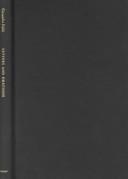| Listing 1 - 5 of 5 |
Sort by
|
Book
ISBN: 0691031851 9780691031859 1306986125 0691608431 1400862337 9781400862337 9780691608433 Year: 1991 Publisher: Princeton, New Jersey
Abstract | Keywords | Export | Availability | Bookmark
 Loading...
Loading...Choose an application
- Reference Manager
- EndNote
- RefWorks (Direct export to RefWorks)
In this portrait of the flamboyant Milanese courtier Francesco Filelfo (1398-1481), Diana Robin reveals a fifteenth-century humanism different from the cool, elegant classicism of Medicean Florence and patrician Venice. Although Filelfo served such heads of state as Pope Pius II, Cosimo de' Medici, and Francesco Sforza, his humanism was that of the "other"--the marginalized, exilic writer, whose extraordinary mind yet obscure origins made him a misfit at court. Through an exploration of Filelfo's disturbing montages in his letters and poems--of such events as the Milanese revolution of 1447 and the plague that swept Lombardy in 1451--Robin exposes the extent to which Filelfo, once viewed as an apologist for his patrons, criticized their militarism, sham republicanism, and professions of Christian piety. This study includes an examination of Filelfo's deeply layered references to Horace, Livy, Vergil, and Petrarch, as well as a comparison of Filelfo to other fifteenth-century Lombard writers, such as Cristoforo da Soldo, Pier Candido Decembrio, and Giovanni Simonetta. Here Robin presents her own editions of selections from Filelfo's Epistolae Familiares, Sforziad, Odae, and De Morali Disciplina, many of these texts appearing for the first time since the Renaissance.Originally published in 1991.The Princeton Legacy Library uses the latest print-on-demand technology to again make available previously out-of-print books from the distinguished backlist of Princeton University Press. These editions preserve the original texts of these important books while presenting them in durable paperback and hardcover editions. The goal of the Princeton Legacy Library is to vastly increase access to the rich scholarly heritage found in the thousands of books published by Princeton University Press since its founding in 1905.
Authors, Latin (Medieval and modern) --- -Renaissance --- Renaissance --- Revival of letters --- Civilization --- History, Modern --- Civilization, Medieval --- Civilization, Modern --- Humanism --- Middle Ages --- Correspondence --- History --- Filelfo, Francesco --- Milan (Italy) --- -Milan (Italy) --- -Court and courtiers --- -Correspondence --- Intellectual life --- Filelfo, Francesco, --- Court and courtiers --- Intellectual life. --- Francesco Filelfo --- Philelphus, Franciscus --- Mailand (Italy) --- Milano (Italy) --- Milão (Italy) --- Mediolanum (Italy) --- Comune di Milano (Italy) --- -Mailand (Italy) --- Correspondence. --- Philelphus, Franciscus, --- Philelfus, Franciscus, --- Philelphe, --- Robiatinus, Bernardinus,
Book
ISBN: 9780674035638 0674035631 Year: 2009 Volume: 41 Publisher: Cambridge (Mass.) : Harvard university press,
Abstract | Keywords | Export | Availability | Bookmark
 Loading...
Loading...Choose an application
- Reference Manager
- EndNote
- RefWorks (Direct export to RefWorks)
The 'Odes', completed in the mid-1450s, constitute the first complete cycle of Horatian odes since classical antiquity. This volume features the Latin text and an English translation.
Odes, Latin (Medieval and modern) --- Odes latines médiévales et modernes --- Translations into English. --- Traductions anglaises --- Filelfo, Francesco, --- Odes latines médiévales et modernes --- Latin odes, Medieval and modern --- Latin poetry, Medieval and modern --- Francesco Filelfo --- Philelphus, Franciscus --- Filelfo, Francesco --- 18.48 Neo-Latin literature. --- Odes, Latin (Medieval and modern). --- Filelfo, Francesco. --- Philelphus, Franciscus, --- Philelfus, Franciscus, --- Philelphe, --- Robiatinus, Bernardinus, --- Odes, Latin (Medieval and modern) - Translations into English --- Filelfo, Francesco, - 1398-1481 - Translations into English --- Filelfo, Francesco, - 1398-1481

ISBN: 1281125547 9786611125547 0226239330 9780226239330 9780226239316 0226239314 0226239322 9780226239323 9781281125545 661112554X Year: 2000 Publisher: Chicago University of Chicago Press
Abstract | Keywords | Export | Availability | Bookmark
 Loading...
Loading...Choose an application
- Reference Manager
- EndNote
- RefWorks (Direct export to RefWorks)
By the end of the fifteenth century, Cassandra Fedele (1465-1558), a learned middle-class woman of Venice, was arguably the most famous woman writer and scholar in Europe. A cultural icon in her own time, she regularly corresponded with the king of France, lords of Milan and Naples, the Borgia pope Alexander VI, and even maintained a ten-year epistolary exchange with Queen Isabella and King Ferdinand of Spain that resulted in an invitation for her to join their court. Fedele's letters reveal the central, mediating role she occupied in a community of scholars otherwise inaccessible to women. Her unique admittance into this community is also highlighted by her presence as the first independent woman writer in Italy to speak publicly and, more importantly, the first to address philosophical, political, and moral issues in her own voice. Her three public orations and almost all of her letters, translated into English, are presented here for the first time.
Speeches, addresses, etc., Latin (Medieval and modern) --- Authors, Latin (Medieval and modern) --- Humanists --- Feminists --- Feminism --- Social reformers --- Latin authors (Medieval and modern) --- Latin orations, Medieval and modern --- Latin speeches, Medieval and modern --- Scholars --- Fedele, Cassandra, --- Fidelis, Cassandrae, --- Italy --- Intellectual life --- early modern european literature, lit criticism, 15th century, female authors, women writers, venice, italy, cultural icon, king of france, milan naples, scholarship, renaissance period, pope alexander vi, queen isabella, ferdinand, spain, world leaders, letters, correspondence, epistulary writing, pen pals, independent woman, middle class, moral issues, ethics, social commentary, public orations, politics, history, political figures.

ISBN: 1281125946 9786611125943 0226590097 9780226590097 9780226590073 0226590070 9780226590080 0226590089 0226590070 0226590089 9781281125941 6611125949 Year: 2004 Publisher: Chicago University of Chicago Press
Abstract | Keywords | Export | Availability | Bookmark
 Loading...
Loading...Choose an application
- Reference Manager
- EndNote
- RefWorks (Direct export to RefWorks)
Renowned in her day for her scholarship and eloquence, Isotta Nogarola (1418-66) remained one of the most famous women of the Italian Renaissance for centuries after her death. And because she was one of the first women to carve out a place for herself in the male-dominated republic of letters, Nogarola served as a crucial role model for generations of aspiring female artists and writers. This volume presents English translations of all of Nogarola's extant works and highlights just how daring and original her convictions were. In her letters and orations, Nogarola elegantly synthesized Greco-Roman thought with biblical teachings. And striding across the stage in public, she lectured the Veronese citizenry on everything from history and religion to politics and morality. But the most influential of Nogarola's works was a performance piece, Dialogue on Adam and Eve, in which she discussed the relative sinfulness of Adam and Eve-thereby opening up a centuries-long debate in Europe on gender and the nature of woman and establishing herself as an important figure in Western intellectual history. This book will be a must read for teachers and students of Women's Studies as well as of Renaissance literature and history.
Speeches, addresses, etc., Latin (Medieval and modern) --- Women --- Authors, Latin (Medieval and modern) --- Humanists --- Human females --- Wimmin --- Woman --- Womon --- Womyn --- Females --- Human beings --- Femininity --- Latin orations, Medieval and modern --- Latin speeches, Medieval and modern --- History --- Nogarola, Isotta, --- Italy --- Verona (Italy) --- Ṿeronah (Italy) --- Intellectual life --- collected works, collection, anthology, letters, discussion, bible, biblical, speeches, speech, oratory, classics, classical, female, feminine, feminist, italy, italian, renaissance, role model, women, womens issues, translation, english, greco roman, thinker, intellectual, verona, morals, morality, sin, humanist, western, literature, literary, performance, college, university.
Book
ISBN: 9780866985741 0866985743 9780866987349 0866987347 Year: 2017 Publisher: Toronto Arizona Center for Medieval and Renaissance Studies
Abstract | Keywords | Export | Availability | Bookmark
 Loading...
Loading...Choose an application
- Reference Manager
- EndNote
- RefWorks (Direct export to RefWorks)
This volume presents in translation 100 previously unknown letters of Ippolita Maria Sforza (1445-1488), daughter of the Duke of Milan, who was sent at age twenty to marry the son of the infamously brutal King Ferrante of Naples. Sforza's letters display the adroit diplomacy she used to strengthen the alliance between Milan and Naples, then the two most powerful states in Italy, amid such grave crises as her brother's assassination in Milan and the Turkish invasion of Otranto. Still, Ippolita lived as a hostage at the Neapolitan court, subject not only to the threat of foreign invasion but also to her husband's well-known sexual adventures and her father-in-law's ruthlessness. Soon after Ippolita's mysterious death in 1488, the fraught Naples-Milan alliance collapsed.
Sforza, Ippolita, --- Naples (Kingdom) --- Court and courtiers --- History
| Listing 1 - 5 of 5 |
Sort by
|

 Search
Search Feedback
Feedback About UniCat
About UniCat  Help
Help News
News